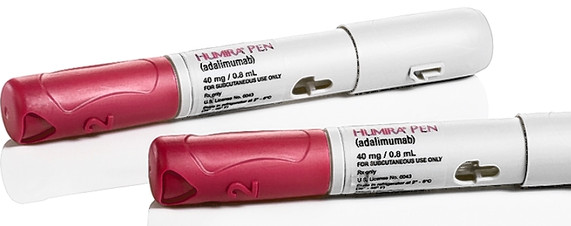 Psoriasis patients across the country have search for relief for their skin and joint ailments for years. As new drugs appear on the market, more individuals confront the effects of this disease on their physical and psychological well being and reach out for hopes of relief. HUMIRA (Adalimumab) has shown great promise in addressing multiple symptoms – so what is HUMIRA, and how is it used for psoriasis?
Psoriasis patients across the country have search for relief for their skin and joint ailments for years. As new drugs appear on the market, more individuals confront the effects of this disease on their physical and psychological well being and reach out for hopes of relief. HUMIRA (Adalimumab) has shown great promise in addressing multiple symptoms – so what is HUMIRA, and how is it used for psoriasis?
“We now know that psoriasis is really a systemic disease,” says Dr. Adam Mamelak, board-certified dermatologist in Austin, Texas. “While most of the patients in the dermatology clinic come in because of the plaques on their skin or arthritis symptoms, we also recognize psoriasis can have profound emotional effects, not to mention diabetes and cardiac health.
How HUMIRA Works
For patients suffering from plaque psoriasis, HUMIRA works to block tumor necrosis factor-alpha (TNF), helping to keep the immune system from over-producing new skin cells.
Those with psoriatic arthritis will see HUMIRA work a little differently. HUMIRA targets and helps block tumor necrosis factor, one of the primary causes of inflammation in those suffering from psoriatic arthritis.
HUMIRA’s Effectiveness
“HUMIRA is part of a class of medications commonly known as biologicals or biologics,” says Dr. Miriam Hanson, board certified dermatologist at Sanova Dermatology. The medication is actually composed of antibodies that specifically target signaling molecules in the immune system that are overactive in psoriasis.
In clinical trials conducted for the treatment of plaque psoriasis, a change in psoriasis over a four month period of 75% reduction in 7 out of 10 adults was seen.
In the case of psoriatic arthritis, HUMIRA was seen to help prevent any further joint damage when evaluated at 48 weeks. Major symptoms were seen to be reduced in most patients in just 3 months.
Potential Side Effects
Regardless of why you’re taking HUMIRA, the side effects are the same.
- Infections, including Hepatitis B infections in carriers of the virus
- Allergic reactions
- Nervous system problems
- Blood problems
- Liver problems
- Psoriasis (new or worsening)
- Reactions to the immune system
Who Should Avoid HUMIRA
- Patients with any kind of existing infection
- Patients with cancer
- Patients with allergies to latex or rubber
 It is improtant to review your health history with your dermatologist before to starting treatment. “Prior to starting treatment, psoriasis patients that are candidates for HUMIRA will have screening blood work, a chest X-ray and a TB test to ensure the medication is safe and to minimize potential side effects,” explains Dr. Mamelak.
It is improtant to review your health history with your dermatologist before to starting treatment. “Prior to starting treatment, psoriasis patients that are candidates for HUMIRA will have screening blood work, a chest X-ray and a TB test to ensure the medication is safe and to minimize potential side effects,” explains Dr. Mamelak.
Contact Us
If you suffer from psoriasis and are exploring treatment options, please contact us. The physicians and staff at Sanova Dermatology can assist you with any questions or concerns you have about your skin and health.
Join Us
